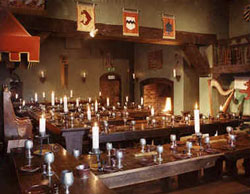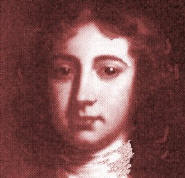| CHRISTMAS AT COURT 
MASTER OF THE REVELS
The Master of the Revels was an English court official, who, from Tudor times up until the Licensing Act of 1737, supervised the production and financing of often elaborate court entertainments. He later was the official issuer of licenses to theatres and theatrical companies and the censor of publicly performed plays. A Master of the Revels was first appointed about 1495, and the Revels office soon developed a complicated system for building and painting spectacular scenery. In 1545 Sir Thomas Cawarden became master for life, and thereafter the office assumed importance. Decrees in 1581 and 1603 gave the Master of Revels licensing, censorship, and fee-collecting powers. The prestige of the office reached its high point during the mastership of Sir Henry Herbert (1623-42), after which England's theatres were closed during the Puritan interregnum. 
SIR HENRY HERBERT After the Restoration (1660), Herbert was reinstalled as master until his death in 1673, but the office was gradually stripped of its power. The Licensing Act of 1737 abolished it entirely, granting the power of censorship directly to the Lord Chamberlain. Although the Revels office did not have exclusive control over all court entertainment, the accounts and detailed records of the office are a valuable source for information on elaborate court productions from the 15th through the early 18th century. 
Backgrounds & page design by ForeverAmber |  Free Forum Hosting
Free Forum Hosting